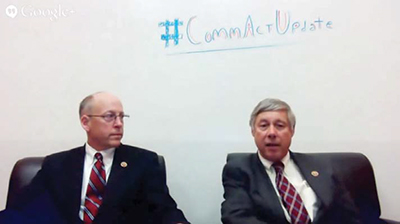What Tom Said: Telecom Rewrite is Long Overdue
Tom Butts
Editor-In-Chief
tbutts@nbmedia.com
WASHINGTON—Several members of Congress with influence over communications and technology have announced their intention to revisit and update the Communications Act of 1996, which itself was an update of the all-encompassing Communications Act of 1934. More than 60 years had passed between the first and second updates; only 17 years have elapsed since its update. You could interpret the difference in time length in two ways: the rapid acceleration of technological change in the past two decades or Congress’ inability to keep up with such changes. Probably a little bit of both.
House Energy and Commerce Committee Chairman Rep. Fred Upton (R-Mich.) and Technology Subcommittee Chairman Rep. Greg Walden (R-Ore.) made their intentions known during a webcast on Google Hangouts, in what aptly illustrates a mix of old and new technologies: a whiteboard with the hashtag #CommActUpdate written on it.
“It’s been quite some time since there’s been any type of update or hearings reviewing the Communications Act and we’re prepared, in essence, to talk about a launch of a number of hearings that we will have next year, a number of white papers examining a whole number of different issues,” Upton told the Google audience. “Our goal, in fact, will be to use these hearings throughout the course of next year to begin to actually launch an update beginning in 2015.”
Technology waits for no one, especially legislators. Among the main purposes of the 1996 Communications Act was to provide deregulation among broadcast and emerging telecommunications markets. Enough changes had developed over the preceding two decades, including the emergence of cable, satellite and telephony, to warrant the update (interestingly enough, spectrum auctions of the analog kind were a concern for broadcasters back in 1996, but the proposal was nixed in the final version).
A mix of old and new: Legislators announce intent to update Communications Act What the Act didn’t address, understandably so, was the impact of the Internet. At that time, broadband was still in its infancy and most of the industry still perceived it as a PC-centric technology. (“Cable Technology Offers Internet Without a PC” was one such headline on the cover of TV Technology in the summer of 1996). The two Congressmen made it clear that IP technology would be a main focus of the update.

“Google is now the elder statesmen in the technology world, if you think about it,” Walden said. “Google’s been around about 15 years. Twitter’s just six years old. A lot has happened since the last update.”
Get the TV Tech Newsletter
The professional video industry's #1 source for news, trends and product and tech information. Sign up below.
Indeed it has. Although one could take issue with FCC Chairman Tom Wheeler’s claim that the Internet is “the greatest communications revolution in the last 150 years,” there’s no argument that since 1996, it’s had an immense impact on the way we communicate, get our entertainment and information, and do business. In addition, 17 years ago, the Internet as we know it, had virtually no lobbying presence in Washington.
A new communications act is long overdue, but it should not only anticipate the future, it must acknowledge the strengths of our current infrastructure and take steps to protect the best capabilities, and that includes free over-the-air broadcasting. Despite efforts by certain groups inside the beltway to dismiss the industry, broadcasters continue to play a vital role in a media world that can still be characterized by haves and have nots.
In a recent speech at Ohio State University, the new FCC chairman outlined his goals, emphasizing that the commission should facilitate “dynamic technological change to ensure the U.S. has world-class communications networks” and second, “ensuring that our networks reflect our civic values, most notably our belief that communications networks should be accessible to all.”
We couldn’t agree more. We hope Congress agrees with this too.
Tom has covered the broadcast technology market for the past 25 years, including three years handling member communications for the National Association of Broadcasters followed by a year as editor of Video Technology News and DTV Business executive newsletters for Phillips Publishing. In 1999 he launched digitalbroadcasting.com for internet B2B portal Verticalnet. He is also a charter member of the CTA's Academy of Digital TV Pioneers. Since 2001, he has been editor-in-chief of TV Tech (www.tvtech.com), the leading source of news and information on broadcast and related media technology and is a frequent contributor and moderator to the brand’s Tech Leadership events.

